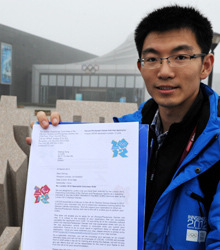| London's Volunteer
 |
|
(XINHUA) |
Song Dalong, a senior student at the Medical School of Qingdao University in east China's Shandong Province, was chosen as a volunteer for the 2012 Olympic Games in London, the only university student volunteer recruited from Shandong.
Song has worked as a volunteer for several previous sporting events, including the 11th Chinese National Games in 2009, the 16th Asian Games in 2010 and the 26th Summer Universiade in 2011.
Besides volunteering at sporting events, Song has also helped the needy receive medical treatment through the Li Ka Shing Foundation, and he has also actively participated in other social welfare work.
"I enjoy helping others, which is why I continue to pursue new opportunities to be involved," said Song.
China's Ministry of Health said on April 23 that its 2012 budget would amount to 80 billion yuan ($12.69 billion), representing a year-on-year increase of 13.3 billion yuan ($2.1 billion).
According to a statement released by the ministry, medical services will get the lion's share, 10.9 billion yuan ($1.73 billion), in order to improve the capacity of major clinical departments at public hospitals.
Meanwhile, 236 million yuan ($37.5 million) will be allocated to education. Another 1.7 billion yuan ($270 million) will go to research projects, which include the development of new drugs and the prevention and control of major infectious diseases such as AIDS and viral hepatitis.
A new visa category titled "talent introduction" has been added to a draft law on China's exit and entry administration as part of the country's efforts to attract talented individuals from overseas.
The draft law was submitted on April 24 to the Standing Committee of the National People's Congress, China's top legislature, for its second reading.
More than 1.3 million Chinese women had received interest-deducted loans to set up their own businesses as of the end of 2011, a senior official from the All-China Women's Federation (ACWF) said on April 19.
Under a specialized assistance program introduced in mid-2009, the government offers subsidized interest on small loans to eligible female candidates in both rural and urban regions.
Last year, the government issued subsidies amounting to 2.3 billion yuan ($365 million), with the total amount of loans offered reaching 55.6 billion yuan ($8.83 billion), said Song Xiuyan, Vice Chairwoman of the ACWF.
An average Chinese person read four books, 100 newspapers and 6.67 magazines last year, according to a survey released on April 23.
Only 1.2 percent of those surveyed thought they were well-read, while 50.7 percent admitted they didn't read enough, said the Chinese Academy of Press and Publication, organizer of the survey.
The comprehensive reading rate for people aged 18 to 70 reached 77.6 percent, a slight increase of 0.5 percentage points.
Overall, however, the survey shows a decline in the number of Chinese people who read both newspapers and magazines.
Those reading online increased by 11.1 percent on figures from 2010, with an average of 47.53 minutes being spent reading on the Internet every day.
Moreover, 27.6 percent of those surveyed preferred reading on their mobile phones, 4.6 percentage points higher than last year. People spent an average of 13.53 minutes reading on phones daily, and 20.75 yuan ($3.29) for the service annually.
A national plan on island protection and exploration has officially gone into effect, the State Oceanic Administration (SOA) said on April 19.
Approved by the State Council, or China's cabinet, the plan focuses on strengthening protection of sea islands' ecosystems, gradually standardizing exploration and improving the habitation environment by 2020.
The SOA has urged its local branches to finish the formulation of corresponding island protection regulations at provincial level this year.
A remote area in southwest China's Tibet Autonomous Region has been recommended by the East Asia Core Observatories Association as the location for a new international astronomical observatory.
The planned observatory will enable scientists from China, Japan and the Republic of Korea to build large-scale telescopes and carry out joint research programs, said Yao Yongqiang, chief researcher with the National Astronomical Observatories of the Chinese Academy of Sciences.
Yao said a possible location for the new observatory will be in the mountains of Tibet's Ngari Prefecture, at an altitude of 5,100 meters.
The location near the town of Shiquanhe, with easy access to road transport and little cloud cover and humidity, would be ideal for observation activities, he said.
Beijing is expected to face a water shortage of 1.3 billion cubic meters this year, accounting for a third of the city's annual water usage, according to local water authorities.
"The municipal government will work to keep the capital's water consumption within 3.7 billion cubic meters this year, as only 2.4 billion cubic meters will be supplied by local water resources," said Cheng Jing, head of the Beijing Water Authority, on April 25.
Beijing has been plagued by droughts for 13 consecutive years, with its fast-paced economic development and ever-growing population exacerbating the water shortage.
The available per-capita water resources in Beijing have dropped to 100 cubic meters, about one 10th of the internationally acknowledged warning level, according to Cheng.
Local authorities have tightened water management policies by setting a ceiling for the city's annual water consumption at 4 billion cubic meters by 2015. | 